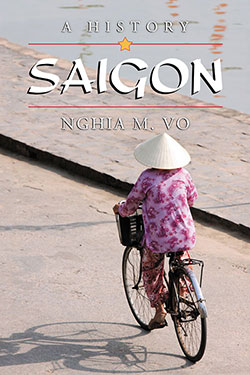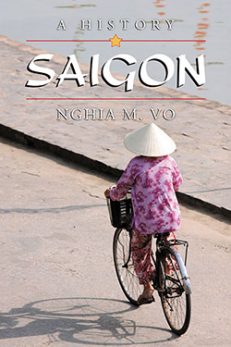Saigon
A History
$29.95
In stock
About the Book
Saigon (since 1976, officially Hồ Chí Minh City but widely still referred to as Saigon) is the largest metropolitan area in modern Vietnam and has long been the country’s economic engine. This is the city’s complete history, from its humble beginnings as a Khmer village in the swampy Mekong delta to its emergence as a major political, economic and cultural hub.
The city’s many transitions through the hands of the Chams, Khmers, Vietnamese, Chinese, French, Japanese, Americans, nationalists and communists are examined in detail, as well as the Saigon-led resistance to collectivization and the city’s central role in Vietnam’s perestroika-like economic reforms.
About the Author(s)
Bibliographic Details
Nghia M. Vo
Format: softcover (6 x 9)
Pages: 307
Bibliographic Info: tables, appendix, notes, bibliography, index
Copyright Date: 2011
pISBN: 978-0-7864-6466-1
eISBN: 978-0-7864-8634-2
Imprint: McFarland
Table of Contents
Preface 1
1. The Riverine Trading Post (1698–1777) 7
2. Gia Dịnh/Saigon, the Royal Capital (1777–1802) 28
3. Saigon Under the Warlords (1802–1835) 46
4. Colonial Saigon (1858–1920) 59
5. Saigon Through World War II (1920–1945) 88
6. Saigon Under Bao Dai (1945–1954) 110
7. Saigon Under the Ngos (1954–1963) 125
8. American Saigon 145
9. Saigon and the Generals (1967–1975) 158
10. Red Saigon (1975–1988) 192
11. Resurgent Saigon (1988–2010) 223
12. The Little Saigons 249
Epilogue 257
Appendix: Saigon Street Names According to Periods in History 263
Chapter Notes 265
Bibliography 291
Index 297
Book Reviews & Awards
“offers a detailed, affectionate history of the city from its birth as a minor coastal trading post in the late 15th century, through various conquests and re-conquests by warlords and foreign powers, to its present status as a global city”—Reference & Research Book News; “Engaging history”—Ronald B. Frankum, Jr., PhD, Chair, Department of History, Millersville University of Pennsylvania; “In an exquisitely drawn chronicle, Dr. Nghia Vo outlines Saigon’s beginning from a humble village in a muddy swamp, to one of Asia’s premier cities. Vo captivates the reader by weaving Saigon’s turbulent growth within the bloody history of South Vietnam. At times poignant, Vo writes with passion about his home, lamenting its devastation at the hands of the Communist’s, while proud of Saigon’s amazing resilience. Required reading for anyone seeking to understand the South Vietnamese, their plight, and their incredible resurgence after the war.”—George J. Veith, author of Code Name Bright Light: The Untold Story of U.S. POW Rescue Efforts during the Vietnam War, and Black April: The Fall of South Vietnam, 1973–75.





